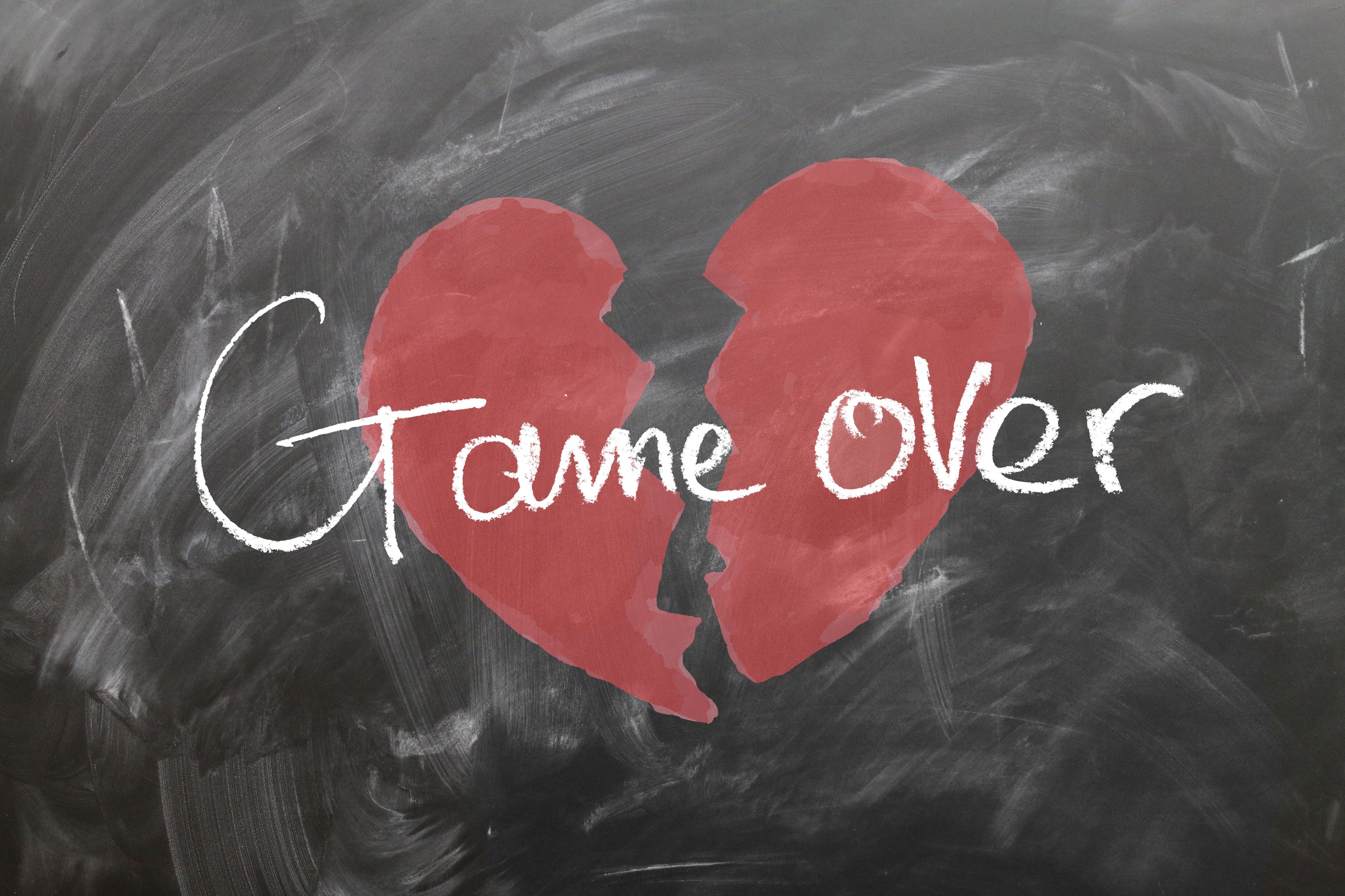It’s normal for us to need some time to ruminate and go over the break-up in minute detail when we feel like we were the one who was dumped. Break-ups can definitely qualify as traumatic events and telling and re-telling the break-up story is a relatively normal reaction if it was traumatic for you.
However, if you’re telling the same story two or three weeks after the break-up to the same friends; feeling that you’re more “depressed” than “just” sad; experiencing emotional pain that is keeping you from engaging in your normal routine, it’s likely going to qualify as “too long.”
Unfortunately, there’s not a magic number for how many weeks it takes to get over a bad break-up, but if you find your thoughts are getting in the way of you moving forward and your friends are tired of hearing you complain, then those are two signs it’s time to get yourself together and move forward.
If the relationship was a significant one that lasted for a long time, then there is likely the need for grieving the loss. But you can’t wear mourning clothes forever.
When it’s been more than a month or two, and you’re still stuck in an emotional holding pattern, you may need to consider seeking professional help. When your depression or grief weighs you down so heavily that you cannot get back into the ebb and flow of social connections and forward momentum after more than a month, you may want to seek professional care.
Physically Working Your Way Through a Break-Up
The best way to stop dwelling on heartache is to throw yourself into activities that keep you busy and engaged in the world. Research shows that one of the best self-help treatments for depression is physical exercise. Exercise produces endorphins and serotonin, which both promote a positive outlook. When we let ourselves spend too much time cocooning under a fuzzy blanket eating ice cream, our brains stop functioning at peak power.

The surest cure for inertia is to start moving again—and whether you start slow with a daily walk through your neighbourhood or join a gym or take up a new sport, there are a lot of opportunities to get to meet new people and begin focusing on building new relationships. This can get your brain out of the “pain begets pain” rut when you allow negative thoughts to drive your behaviour.
The human brain was designed to seek pleasure over pain, but when you spend too much time ruminating on a break-up, the brain grows more familiar with the negative thinking and it begins to find pleasure in the mental anguish pain you’re creating for yourself because it becomes what’s familiar and comfortable.
Forcing yourself out to explore novel activities and new people is a much better way to stimulate your mind—and it’s a great way to meet new people who will help you forget the person that you most need to forget—your ex.
Keep Your Focus on the Future, Not the Past
We all need something to get our minds off a break-up and when it’s something that is like a reward, we might savor it even more. The old saying that time heals all wounds is really about the fact that the brain allows us to forget what troubles us as time and new experiences take up more space in our heads. Getting involved in a fun project, getting out of town for a few days, or adding a new class at the gym or yoga studio are really positive choices and opportunities to promote healing!
Coping with a Break-Up When a Partner was More Than a Partner
It’s not always easy when your partner was a significant part of your support system in emotional and practical ways. It’s hard to lose a person who holds a lot of different social support roles in your life.
However, when you’re forced to find other people to fill that need, it may not be a lot of fun, but it is something that can definitely be done. Instead of wearing down your friends by recounting your break-up saga, reach out and ask them for assistance in helping you move forward.
Ask if anyone is really great with taxes or could recommend someone. Ask a friend to meet up and brainstorm solutions for the problem at work/with your mom/with your neighbour/whoever that you would have been asking your ex to help you solve.
Letting go of a partner is seldom easy; losing your partner and best friend is totally brutal. Know, though, that it happens and that people survive, and that it can benefit you by encouraging you to become a little more independent as well as resourceful!
Binging Away the Heartache Isn’t Always Best
When you begin to wonder if you’re spending too much time eating ice cream and drinking wine, that means you already KNOW the answer to that question—you probably are. We all usually have a pretty good idea of when it’s time for us to get off the couch and get on with life, but some of the clear signs that you’ve been avoiding life too long include when friends keep asking you when you’re going to hang out with them again, or be “normal” again, or finally forget about the ex and start seeing other people.
You might also know it’s time to get back into the world when you realize that your indulgence in “self-care” is making you feel worse instead of better—whether it’s missing out on time with friends or gaining a pound or two, when your “self-care” is making you feel worse about yourself than you did before you started the “self-care binge,” then you know it’s time to move on. And if you realize that you can’t even remember why you started hiding out and gorging on junk food and alcohol, then it’s time to put your energy into getting re-connected with your social support network.
The main thing is to keep engaged with others—if you spend a week or two hiding out and feeling sorry for yourself, that’s not a super big problem. If you’re heading into your third week of Netflix, espresso chip swirl, and prosecco, you need to take action and recharge your routine.
There’s no specific “expiration date” on break-up heartache, but when days have become weeks of mourning or ruminating, it’s a sign that there may be something more significant at play. Everyone feels sad and down some of the time, but when you just can’t get back into gear after a couple of weeks, you might need to seek out professional counselling.
“Rebound Hookups”—Tread Carefully
Primal instincts may drive us to seek out rebound relationships, but it’s essential that you use good judgment and take precautions against making desperate or detrimental choices in your next potential partner.

Research suggests that when we are on the rebound, we typically see the “next great thing” as more attractive in a rebound situation than we normally would. This means that our need to be especially careful that we don’t make more of a physical attraction than we should. Hooking up can scratch an itch, but it’s unlikely that a quick dive back into a hook-up is going to be the best solution to a bad break-up.
If you are after a rebound hookup to get revenge, you might just come away just as angry at your ex as you were before you found someone else to keep you company. Whether or not you choose to hook up as a coping strategy, finding a less potentially self-destructive method would be best.
If you’re still using the “hook-up method of self-soothing” after a few weeks, it’s a sign that you need to consider doing some serious self-exploration to see what’s really missing in your life that may be propelling you to throw-away hook-ups.
“Dating Moratorium”—Wait Until You’re Ready, But Don’t Wait Too Long
Having arbitrary time limits on “singlehood” might seem like it could make things more straightforward than leaving things to chance, but there’s going to be an exception to every rule about how long to wait before trying to date again. The important thing for you to do is to check in with yourself about how you feel about getting back into the mix.
You also shouldn’t get caught up in trying to predict the future (like saying, “I’m doomed. I’ll never find someone who’ll stick around”) or making constant comparisons in your mind about how a potential new partner stacks up to your ex. None of us wants to enter into a relationship where there’s a bar that’s already been set and we’re constantly feeling like we’re in a competition…especially when it’s a competition with an ex, so even if we “win,” we’ve only won against a partner’s past.
You’re ready to go back into the pool when you’ve given yourself time to get back in touch with your own identity, rather than that of “half of a couple.” When you are “dating for companionship,” instead of “dating out of desperation,” you’re giving a potential relationship the right foundation. If you try and lock yourself into a specific dating moratorium, you may miss out on some pleasant experiences with potentially long-term partners.






